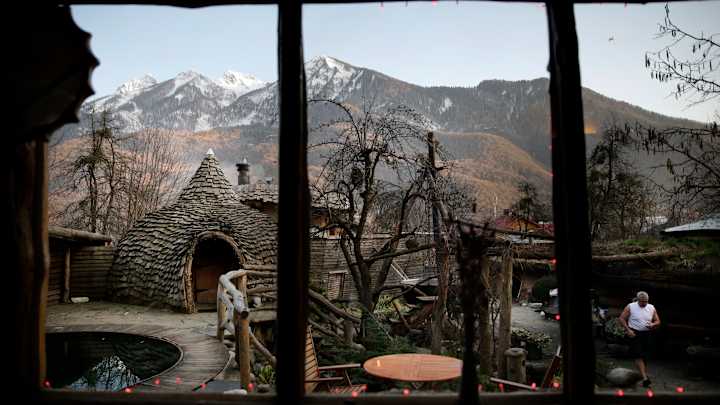Russian banya a treat at the Sochi Olympics

KRASNAYA POLYANA, Russia (AP) ''What's the score?'' asks Svetlana Fedorenko as she enters a bathhouse in the Caucasus Mountains with her husband and friends: The U.S.-Russia hockey game was on, and most of the country was glued to a television.
A few miles away from the ski slopes of Krasnaya Polyana, where athletes are competing for Olympic medals, an outdoor bathhouse called British Banya is attracting visitors.
Russians feel so strongly about the banya, a ritual of sweating it all out in a steam room and whipping each other with bunches of leafy branches, that even a crucial game between the old rivals can't stand in the way of this weekend tradition.
Bathhouse master Ivan Tkach starts his preparations late in the afternoon, at least three hours before the bathing party arrives. He chops the wood, heats up the stove in one room, builds a fire for the Native American sweat lodge, and ignites the blaze beneath a Japanese hot tub, which swings on chains from wooden poles.
''The most important thing about the banya is to have a good spirit in the body,'' Tkach explains. ''When people come to the bathhouse, it is not only about warming up the body, but more importantly about relaxing, getting the toxins out of the body, and, psychologically, leaving the worries behind.''
The banya is an institution in Russia. It's a place where businessmen deals have been struck and romantic comedies have been set. Russians even have a special greeting for each other as they emerge: ''Happy light steam!''
The bathhouse traditions go way back. One of the earliest and most vivid mentions of the banya in Russia chronicles Princess Olga in the late 10th century avenging her husband's death by inviting his killer's emissaries to have a bath in Kiev. She then set fire to the bathhouse while they were enjoying themselves inside.
Russian bathhouse owners are more welcoming these days. Tatyana Larkin has been running the British Banya for seven years since moving from Moscow to start a business of her own. The 46-year-old entrepreneur says she's been a fan of the banya for so long that ''when I faced the choice of what to do next, I didn't have that many options.''
Larkin says Krasnaya Polyana is the ideal place for a bathhouse.
''People come here for a vacation, they ski, they need to have something to do,'' she says.
Larkin describes her bathhouse as an ''interactive museum of bathhouse art.'' Its name was inspired by a visit to the British Museum in London, where she was struck to see a sprawling collection of exhibits from around the globe.
''Our grounds are, of course, not as big as to present the entire collection of bathhouse traditions across the world, but we've tried our best to display the key points so that people can find out about them,'' she says.
One of the highlights of this bathhouse is a Native American sweat lodge, a narrow hut that consists of a frame covered with layers of thick felt. A bathhouse master puts hot stones in the middle of the hut, pours water on it, and lets the people sitting around it enjoy the steam.
Bathhouse master Ivan Tkach is worried: The bathing party is still lounging in the aroma-therapy room, tarrying over tea. ''We're losing steam,'' Tkach complains to a colleague. ''Can't they understand?''
The steam room is the pinnacle of a Russian bathhouse experience. Tkach, who has been heating up the stove for hours, is afraid the guests will feel that the steam ''has died out.''
Valery Fedorenko, a 48-year-old businessman from Krasnodar, comes out of the aroma room with a red towel around his hips and a woolen hat on his head. It's a chilly evening and the steam is evaporating from his shoulders.
For Fedorenko, the weekly bathhouse visit is ''about recreation, health, the joy of friendship, life and longevity.''
He is in Sochi to see the Olympics, but he had to quit watching the hockey game in his hotel room to make time for his weekly bathhouse appointment - the one thing in his planner that he never misses.
Fedorenko says he has been teaching his four children, aged 4 to 27, to make the weekend bathhouse visit a must.
''They all do it. All my friends come over and we go in together,'' he says. ''You can't compare it to anything else.''
